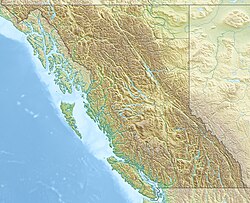| Blackrock Mountain | |
|---|---|
| Highest point | |
| Elevation | 2,911 m (9,551 ft) [1] |
| Prominence | 481 m (1,578 ft) [2] |
| Parent peak | Elephas Mountain 2978 m [2] |
| Listing | |
| Coordinates | 52°34′17″N118°17′59″W / 52.57139°N 118.29972°W [3] [4] |
| Geography | |
| Country | Canada |
| Provinces | Alberta and British Columbia |
| Parent range | Continental |
| Topo map | NTS 83D9 Amethyst Lakes [3] |
Blackrock Mountain is located on the border of Alberta and British Columbia. It was named in 1921 by Arthur O. Wheeler for the black Ordovician rock present in the area. [1] [2] [5]


